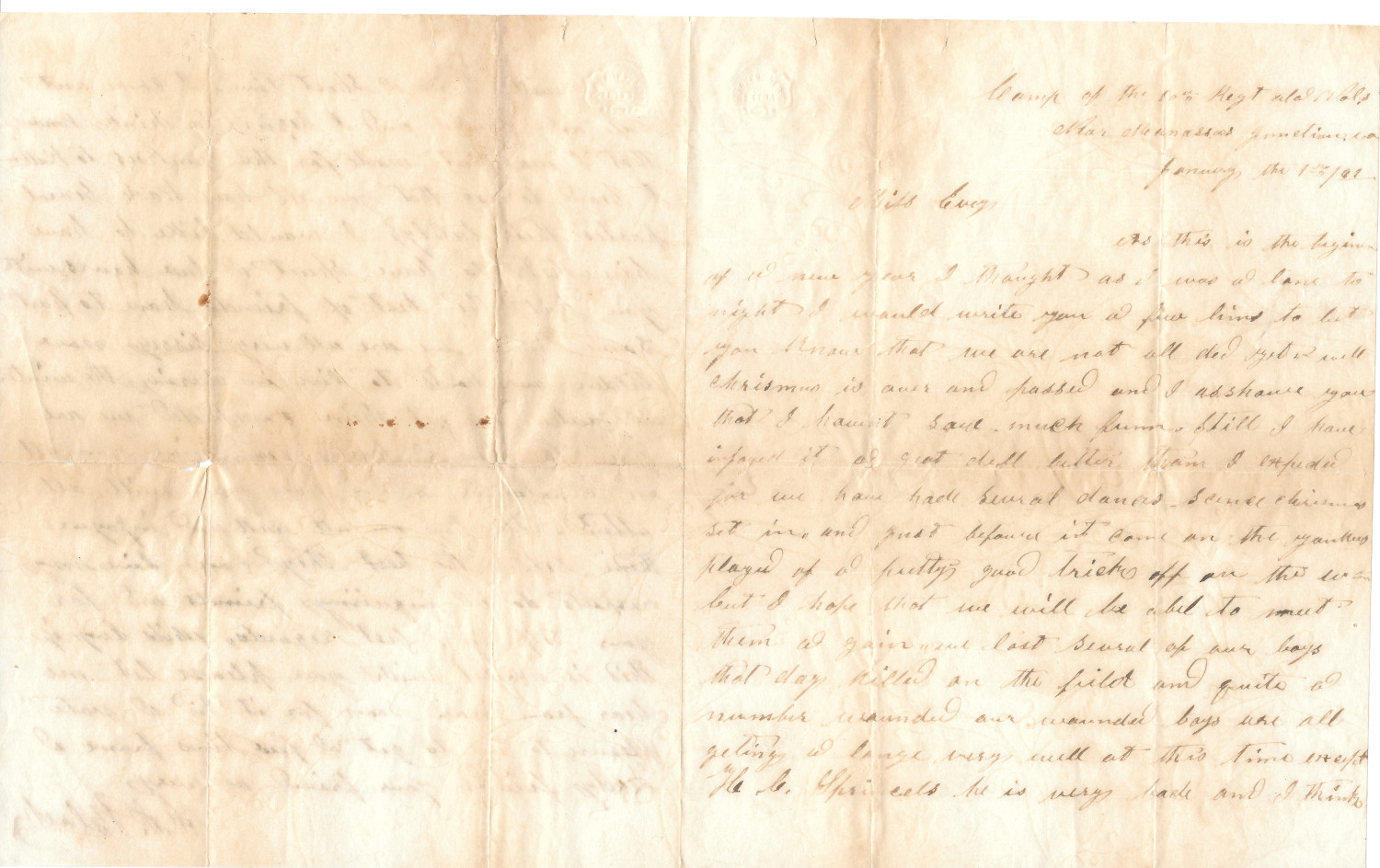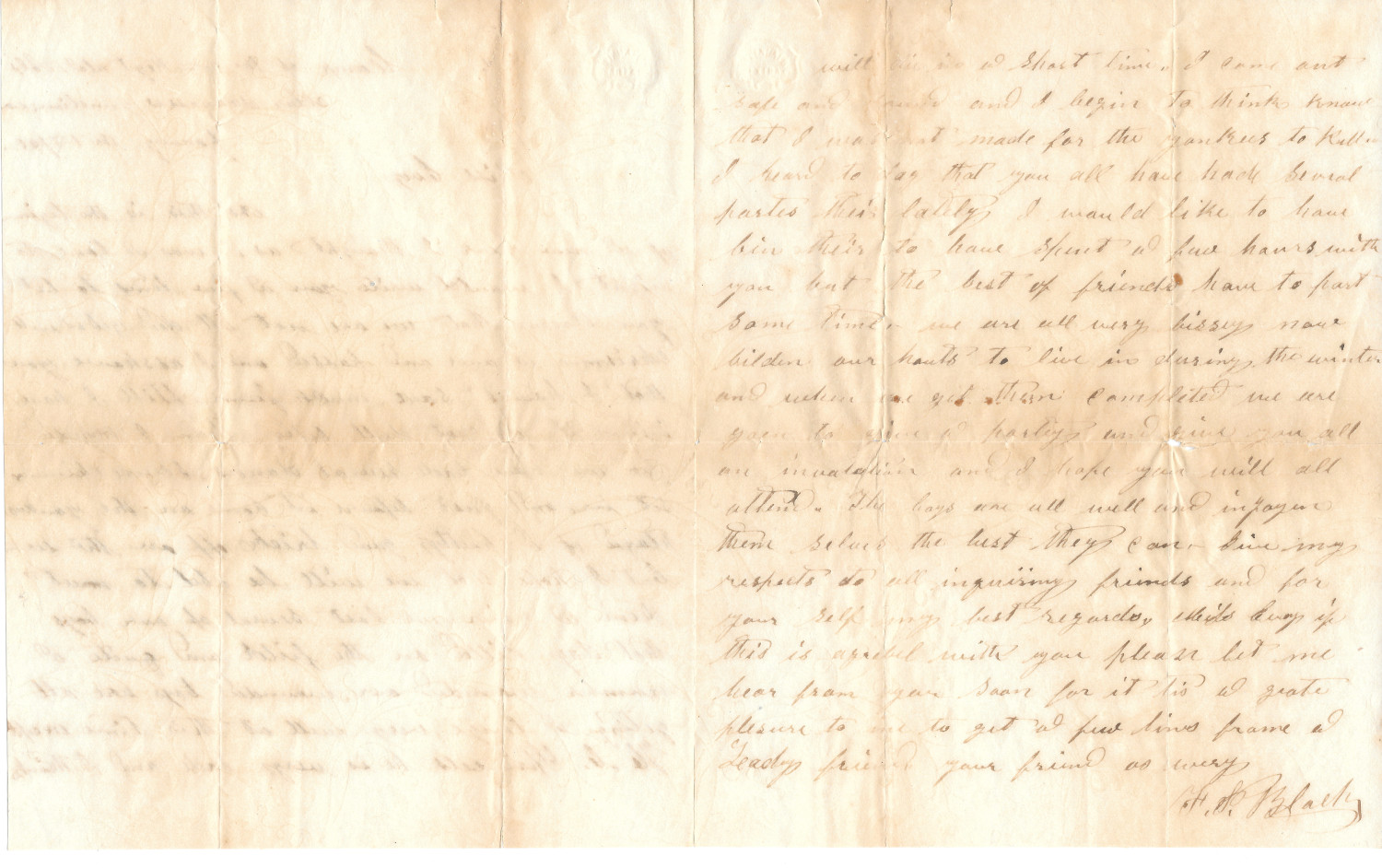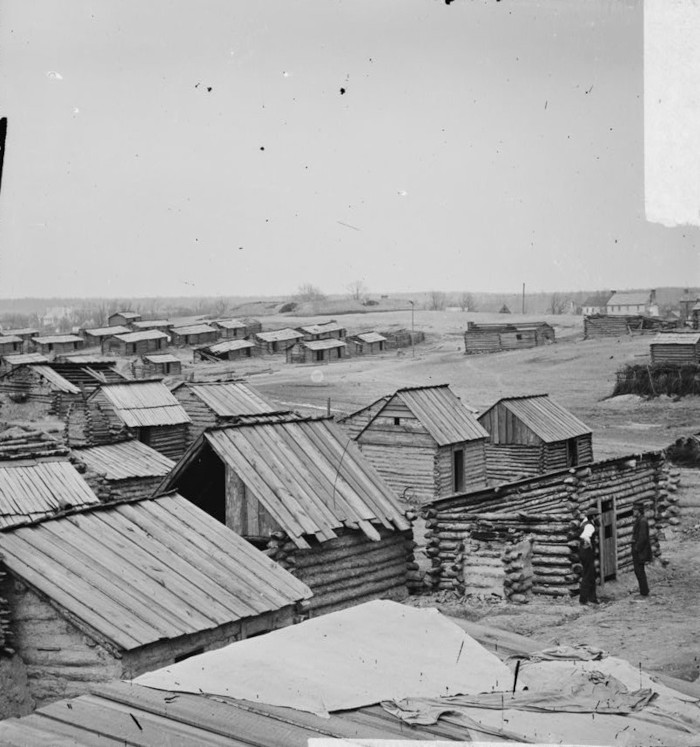“we are not all ded yet”
July 4, 2024
I thought as I was a lone to night I would write you a few lines to let you know that we are not all ded yet ”
Y ears ago I came into possession of a letter written in 1862 by Francis P. Black, a Lieutenant in the 10th Alabama Infantry, to a Miss Evey (Eveline) Johnston back in White Plains, Alabama. Black was a 26-year-old single farmer, originally from South Carolina, when he enlisted in the 10th Alabama in 1861. He belonged to Company H, known as the "Choccolocco Rifles", made up of men primarily from Calhoun County, Alabama.
Though according to the 1860 Federal Census Francis Black’s family was wealthy, he was not a particularly well-educated man. His idiosyncratic spelling makes for challenging reading. It’s unclear whether he had romantic intentions towards Eveline Johnston, who was about 20 at the time, but he obviously considered her a good friend.
Camp of the 10th Regt ala Vols
Near Manassas Junction, vaJanuery the 1st / 61 [probably written by mistake, instead of 62]
Miss Evey
As this is the beginin of a new year I thought as I was a lone to night I would write you a few lines to let you know that we are not all ded yet. well Chrismus is over and passed and I asshoure you that I havent saw much funn. Still I have injoyed it a grat deell better than I expected for we have hade sevral dances scence chrismus set in, and just befoure it came on the yankees played of a pretty good trick off on the w[?] but I hope that we will be abel to meet them a gain we lost sevral of our boys that day killed on the feild and quite a number wounded our wounded boys are all geting a longe very well at this time except H.C. Sprincels he is very bade and I think will die in a short time. I came out safe and sound and I begin to think know that I was not made for the yankees to kill. I heard to day that you all have hade sevral partes their lately. I would like to have bin their to have spent a few hours with you but the best of friends have to part some time, we are all very bissey now bilden our hauts to live in during the winter and when we get them completed we are goin to give a party and give you all an invatation and I hope you will all attend. The boys are all well and injoyen them selves the best they can. Give my respects to all inquiring friends and for your self my best regards. Miss Evey if this is agrebel with you please let me hear from you soon for it tis a grate plesure to me to get a few lines frome a [?] friend. your friend as every
F.P. Black


The engagement mentioned in this letter is the Battle of Dranesville, VA, Dec. 20, 1861. The wounded man called "H.C. Sprincels" seems to be Private William H. Sprinkles of Co. H, 10th Alabama, who received a gunshot wound to the knee at Dranesville and died Jan. 16, 1862. He was a 24-year-old farmer, also born in South Carolina. The letter seems to be dated Jan. 1, 1861, but both the location of the regiment and the mention of the battle indicate that it was 1862, and Black wrote a "1" by mistake.
Black mentions building huts because the army had presumably settled into winter quarters. It was difficult for the armies to campaign during the winter months due to bad weather and even worse roads. Anticipating a long stay in one place, the soldiers would build semi-permanent structures so they could live more comfortably than in a tent.

Francis Black was later promoted to Captain of Co. H, and was killed at Turkey Ridge during the Battle of Cold Harbor, Virginia on June 6, 1864. He was about 29 years old. Whatever Eveline Johnston's feelings for him might have been, she held onto his letter, and so it got saved for posterity.
References
- 1860 Federal Census lists an F. P. Black (age 25, born in SC) living in White Plains, Alabama, along with Peter Black, age 69, Elizabeth Black, age 70, and Arcane Black, age 8: "United States Census, 1860," database with images, FamilySearch (24 March 2017), Alabama > Calhoun > Ranges no 8 and 9 > image 64 of 133; from "1860 U.S. Federal Census - Population," database, Fold3.com (n.d.); citing NARA microfilm publication M653 (Washington, D.C.: National Archives and Records Administration, n.d.).
- According to Alabama Civil War Service Database , Black had been born in South Carolina and was a 26-year-old single farmer when he enlisted, and he was killed at Turkey Ridge (Cold Harbor), VA, June 6, 1864
- 1860 Federal Census Slave Schedule shows that Peter Black, a wealthy farmer with $25,000 worth of real estate and $60,000 worth of personal estate, held 45 people enslaved
- 1860 Federal Census lists Eveline Johnston, age 18, living in White Plains, Alabama: "United States Census, 1860," database with images, FamilySearch (24 March 2017), Alabama > Calhoun > Ranges no 8 and 9 > image 62 of 133; from "1860 U.S. Federal Census - Population" , database, Fold3.com< (n.d.); citing NARA microfilm publication M653 (Washington, D.C.: National Archives and Records Administration, n.d.).
- FamilySearch page on the 10th Alabama Infantry
- Details about William H. Sprinkles from Compiled Service Records of Confederate Soldiers Who Served in Organizations from the State of Alabama , accessed at Fold3
- Image: Manassas, Virginia. Confederate winter quarters , Civil war photographs, 1861-1865, Library of Congress Prints and Photographs Division